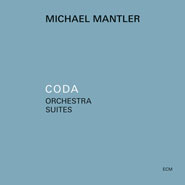
CODA
- ORCHESTRA SUITES
ECM
2697
music by Michael Mantler
with
Bjarne Roupé
( guitar)
David Helbock
(piano)
Michael Mantler (trumpet)
Orchestra
conducted
by Christoph
Cech
recorded September - October 2019
Vienna, Austria
and
Pernes-Les-Fontaines, France
Leo
Eibensteiner (flute)
Peter Tavernaro (oboe)
David Lehner (clarinet)
Fabian Rucker (bass clarinet)
Michael Mantler (trumpet
Christoph Walder (French horn)
Daniel Riegler (trombone)
Simon Teurezbacher (tuba)
Joanna Lewis, Ulrike Greuter, Diane Pascal, Tomas Novak,
Simon Frick, Maximilian Bratt, Magdalena Zenz, Emily Stewart (violins)
Simon Schellnegger, Anna Magdalena Siakala,
Daniel Moser, Tamara Stajner (violas)
Asja Valcic, Arne Kircher (celli)
Tibor Kövesdi, Philipp Kienberger (basses)
Maximilian Kanzler (vibraphone, marimba)
David Helbock (piano)
Bjarne Roupé (guitar)
About CODA - an interview
What is the concept of Orchestra Suites?
It is somewhat similar to my recent Jazz Composer's Orchestra Update.
At that time, I had re-acquainted myself with my music from the early
Sixties. I was impressed by how fresh and exciting it still sounded, and
It seemed that this music should perhaps be allowed to have a new (and
different) life, reaching a new audience that would probably never have
known it. During this re-processing it turned out that certain of the
compositions remained relatively close to their original versions, albeit
with different soloists, while some were so extensively revised that one
could consider them almost as new compositions.
With Orchestra Suites, that concept was even more drastically applied,
very selectively choosing material for more updates of different musics
that were particularly dear to me (so to say "the best of"…),
taking bits and pieces from various other periods in my career, to be
shaped into entirely new musical suites
Which older works are your referring to?
After careful consideration, there were quite a few, from various albums,
with very diverse instrumentations and concepts, such as Thirteen (a work
for two orchestras plus piano soloist, from 1975), Alien (a studio production
with only synthesizer tracks and trumpet, 1985), Folly Seeing All This
(an album mostly featuring a string quartet, 1992), Cerco un Paese Innocente
(a suite of songs with words by Giuseppe Ungaretti, plus big band and
string quartet, 1994, but now used instrumentally only), Hide and Seek
(a chamber opera with texts by Paul Auster, 2000, now also used without
voices), and For Two (a series of duets for piano and guitar, 2010).
What kind of instrumentation are you using now
and why?
I have always considered myself an orchestral composer, even when, mostly
economical, circumstances dictated smaller ensembles, at times even down-sized
to the absolute minimum, such as the duets of Alien and For Two. This
time I did not retain the original instrumentations, but settled on what
seems to be my current favorite - a chamber orchestra consisting of flute,
oboe, clarinet, bass clarinet, trumpet, french horn, trombone, tuba, guitar,
piano, marimba / vibraphone, plus a string section, normally a string
quintet, as used on my previous album Comment C'est, but this time enlarged
to 16 players.
Unlike the Big Band used for the Jazz Composer's Orchestra Update, very
much a jazz-based ensemble with a more or less traditional rhythm section,
the orchestra used for the current suites consists mostly of classical
musicians with a smaller number of jazz musicians/soloists included, which
still anchors the music in an environment clearly coming from jazz.
Do you actually prefer updating and revising
older music instead of writing new music?
Re-using material from my own musical universe is a conscious decision
and has, as a matter of fact, been my compositional procedure for a long
time. Musicologists could have an interesting time divining what in my
music has come from where and how it might have been re-shaped and recycled
… something I myself, however, never consider again and immediately
forget. Almost always, when I start a new composition, I begin with materials
from the previous work, sometimes perhaps with elements that had been
discarded at the time, which I may end up not actually using, but more
often than not, that procedure would at least start me off on a new line
of musical thought from which to continue.
The role of soloists and/or improvisation?
As always, still some improvisation, incorporated into the continuous
flow of a composition, moving, perhaps almost imperceptibly at times,
between actual improvisation and loosely interpreted notated sequences.
Instrumental soloists have here often replaced, that is, "sung,"
what were vocal melodies from some of the original versions.
An orchestra and soloists, employing a total
of 27 musicians plus a conductor - how does a large production such as
this come into being?
As so often, already since as far back as 2006, it has been made possible
through the effort and co-operation of Christoph Huber at Porgy &
Bess, a supreme concert venue in Vienna, which not only made available
the necessary funds, a rehearsal and concert space, but also recording
facilities, enabling an eventual album release of this material.
Any plans for further updates?
Absolutely not. I think I have exploited my own universe as much as I
feel is desirable or necessary.
New compositions then?
No. I think I've said what I have to say. Which doesn't mean it shouldn't
be said more often than in the past. There exists plenty of material that
has been presented publicly only once. More performances would certainly
be possible and interesting.
Apart from the rare exception, my projects have always been initiated
and carried through fruition by myself, and at this time I have neither
the need nor the will to do it yet again. Nevertheless, should a serious
approach ever be made to create a new work, the mere fact of being asked
to do something could possibly, though, generate enough excitement to
at least consider it. Who knows ...
-- Michael Mantler

Photo: Wolfgang Gonaus